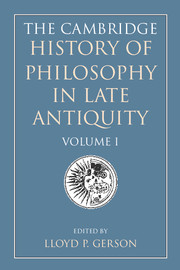Book contents
- Frontmatter
- General introduction
- I Philosophy in the later Roman Empire
- Introduction to Part I
- 1 The late Roman Empire from the Antonines to Constantine
- 2 The transmission of ancient wisdom: texts, doxographies, libraries
- 3 Cicero and the New Academy
- 4 Platonism before Plotinus
- 5 The Second Sophistic
- 6 Numenius of Apamea
- 7 Stoicism
- 8 Peripatetics
- 9 The Chaldaean Oracles
- 10 Gnosticism
- 11 Ptolemy
- 12 Galen
- II The first encounter of Judaism and Christianity with ancient Greek philosophy
- III Plotinus and the new Platonism
- IV Philosophy in the age of Constantine
- V The second encounter of Christianity with ancient Greek philosophy
- Map 1 The Byzantine Empire, c. 500
4 - Platonism before Plotinus
from I - Philosophy in the later Roman Empire
Published online by Cambridge University Press: 28 May 2011
- Frontmatter
- General introduction
- I Philosophy in the later Roman Empire
- Introduction to Part I
- 1 The late Roman Empire from the Antonines to Constantine
- 2 The transmission of ancient wisdom: texts, doxographies, libraries
- 3 Cicero and the New Academy
- 4 Platonism before Plotinus
- 5 The Second Sophistic
- 6 Numenius of Apamea
- 7 Stoicism
- 8 Peripatetics
- 9 The Chaldaean Oracles
- 10 Gnosticism
- 11 Ptolemy
- 12 Galen
- II The first encounter of Judaism and Christianity with ancient Greek philosophy
- III Plotinus and the new Platonism
- IV Philosophy in the age of Constantine
- V The second encounter of Christianity with ancient Greek philosophy
- Map 1 The Byzantine Empire, c. 500
Summary
THE PLATONICS
This chapter deals with the development of Platonism from the late first century bce to the end of the second century ce. The principal figures here, in rough chronological order, were Eudorus, Thrasyllus, anon. Commentary on the Theaetetus, Plutarch of Chaeronea, Theon, Taurus, Albinus, Nicostratus, Atticus, Severus, Harpocration, and Alcinous. All are normally treated as Platonists today; antiquity treated most of them as ‘Platonics’.
By the end of the first century ce we hear of philosophers who could be described as ‘Platonics’ (Platonici), whether as a title connected with a recognized profession or as a general description of their concerns. There were a number of centres around the Mediterranean at which a ‘Platonic’ might reside and operate. During the Hellenistic period there had been no need for such a term at all, since one’s philosophical background had usually been indicated with reference to the philosophical group or school with which one had studied (usually at Athens), and to which one continued to feel some allegiance. Up to Cicero’s generation it was normal for those with serious educational ambitions to study in Athens, and not unusual to seek tuition from more than one school. Those men of letters who felt the need to communicate in a philosophical vein did not normally have to adopt any title that indicated their favourite philosophy, while those who claimed to officially represent a school, and to teach its doctrines or methods, adopted such titles to legitimize their role.
- Type
- Chapter
- Information
- The Cambridge History of Philosophy in Late Antiquity , pp. 63 - 99Publisher: Cambridge University PressPrint publication year: 2000
- 3
- Cited by

